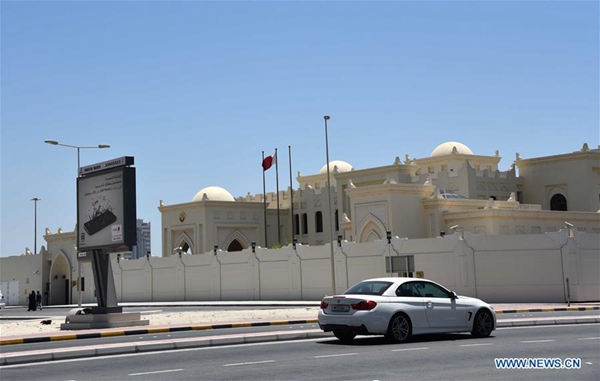Why has the Arab world cut ties with Qatar?
- By Zou Zhiqiang
 0 Comment(s)
0 Comment(s) Print
Print E-mail China.org.cn, June 11, 2017
E-mail China.org.cn, June 11, 2017
|
|
|
Photo taken on June 5, 2017 shows the Embassy of Qatar in Manama, Bahrain. Bahrain announced Monday it cut ties with Qatar, accusing the country of disturbing its security and stability. [Photo/Xinhua] |
On June 6, Saudi Arabia, along with the United Arab Emirates (UAE), Bahrain, Egypt, Yemen, the Maldives and Libya, broke off diplomatic relations with Qatar, accusing the Gulf state of supporting and financing terrorism and extremism as well as undermining security and stability in the region. Meanwhile, the Arab League also announced that Qatar would be expelled from the organization.
Both Saudi Arabia and Qatar were members of the Arab League and the Gulf Cooperation Council (GCC), but had long been at loggerheads over foreign policy issues.
Qatar was not hostile to the Arab Spring, and has since been active as a mediator in Middle East affairs. The disagreements between Qatar and its neighboring countries mainly involve the Muslim Brotherhood, Syria, Iran, Hamas, and the regional development mode.
In the process, Qatar has been trying to take over the leading role played by Saudi Arabia among the Gulf nations.
A typical event highlighted the deep political divisions among the Gulf nations in 2014, when Saudi Arabia, Bahrain and UAE all withdrew their ambassadors from Doha. The crisis ended with a temporary Qatari compromise.
However, the current crisis still stunned the outside world. As for why these countries chose this time to take action, the following two aspects can explain it.
First, closer relations and unusual interactions between Qatar and Iran have threatened Saudi Arabia's leading role in the Gulf.
The scramble between Saudi Arab and Iran for leadership of the Arab world has become increasingly fierce in recent years. The two sides are irreconcilable and wage a tit-for-tat struggle against each other, often in proxy dispute.
Saudi Arabia obviously regards Iran as its biggest "enemy." To some extent, hostility towards Iran seems to have become "political correctness" among other Gulf nations.
However, Qatar has been drawing ever closer to and defending Iran. Its approach undoubtedly has touched a raw nerve for Saudi Arabia as it is destroying the unity of the Gulf countries in showing hostility and seeking to isolate Iran.
Saudi Arabia's Okaz daily accused Qatar of "breaking ranks" and choosing to "side with enemies of the nation."
At the same time, the diplomatic tie-cutting storm is largely aimed at making an example of Qatar to warn other Arab nations to be very careful who they choose to be friends with.
Second, American adjustment of its Middle East policy and Donald Trump's high-profile visit to Saudi Arabia are also factors that cannot be ignored.
President Trump has now taken a more hostile policy towards Iran since he came to power, and has rebuilt the trust relationship with Saudi Arabia. During his visit there in May, Trump signed a US$110 billion arms deal. In his speech at the Islamic Summit, Trump condemned Iran, saying it was responsible for instability in the Middle East and calling for a coalition to isolate it.
The new American Middle East policy has boosted Saudi Arabia's confidence and, to a certain extent, has also affected the disputes between Saudi Arabia and Iran in vying for the leading position in the Gulf. Saudi Arabia thus decided to seize the opportunity to deflate the arrogance of Qatar, who it feels has always been inconsistent towards Saudi Arabia and ambiguous over Iran.
Therefore, the latest crisis can be seen as a reflection of new subtle changes in the Middle East geopolitical pattern after the United States clarified its Gulf policy.
From a historical point of view, the diplomatic storm this time should not lead to a complete and irreversible breakdown of Gulf relationship. However, it does reflect a series of issues – the deep divisions of Arabian countries, changes in the Middle East geopolitical pattern, and the trend of the United States' Middle East policy – all of which deserve close attention.
The author is an assistant research fellow with the Middle East Studies Institute of Shanghai International Studies University.
The article was translated by Li Jingrong from an unabridged version published in Chinese.
Opinion articles reflect the views of their authors, not necessarily those of China.org.cn.







Go to Forum >>0 Comment(s)